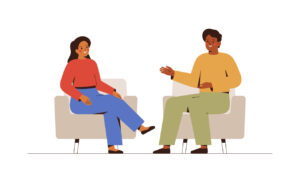Why they do it, and what you can do about it.
by Becky Whetstone Ph.D.
Some people live in a Disneyland reality where life is a field of lollipops, loving families, and well-meaning people. Nothing painful or negative is acknowledged in Disneyland. No negative emotions, and no bad people exist. For those who live in reality, it’s a painful and somewhat strange truth that we’ll encounter disingenuous Disneylanders who don’t appreciate when we tell the truth about our thorny lives or anything else they consider unpleasant. Only pleasantries and nice things may be discussed. They’re impossible to get close to, as what bonds people is the sharing of personal information. If you dare talk about real-life struggles and injustices, they will change the subject or challenge you about it being that bad.
Disneylander: How was your Father’s Day, this year, Becky? I’ll bet it’s sad for you. I got to be with my dad who’s still around, thank God. I realize how fortunate I am.
Becky: That’s great. You know, my dad has been gone over 20 years. I never cried when he died, and I’ve never missed him at all. I think by the time he left, he’d worn out his welcome.
Disneyland: No, no, oh no, Becky. You don’t mean that.
Becky: Oh yes, I do. I wish I could tell him now about all the things I know and realize, since I became a therapist. it would not be very nice. (laughs).
Disneylander: Well, where are you going on vacation this year? Wait, you know, I lost track of time and have got to run. The kids … you know … let’s do lunch!
Becky: You know not everyone had great parents … (looking at her back, as she rushes away).
At social gatherings, they are easy to spot. Miss America or Ken doll smiles that rarely go away, buttoned-up clothes that hide who they are, with body language that screams, “I am so fake and shut down, skip past me if you’re looking for a close relationship.” If you insist on being yourself and doing what they consider oversharing, you’ll get a glare that lasts two seconds, before they change the subject or turn to seek people who stay within their comfort zone. Talking about stellar kids, grandkids, and the weather, is fine, but don’t mention climate change.
Many of these caricatures of joy hail from religious sectors. The docuseries Shiny, Happy, People: Duggar Family Secrets on Amazon Prime, illustrated well the indoctrination of the wholesome 19-child Duggar family, prominent leaders in the Institute in Basic Life Principles (IBLP) religion. While not all Disneylanders are from religion, many are found there, as is the toxic positivity they are taught to project. In the Duggar’s and IBLP’s case, there were allegations of sexual abuse, though, of course, it shouldn’t be inferred that the average Disneylander is a sexual predator, although they do like keeping details of their private lives tucked far away.
On social media, Disneyland behavior is prominent. If you post that you got a promotion, finished your degree, had a grandchild, got a new job, your dog or cat passed away, or you whipped whatever illness, you’ll get hundreds of likes, shares, words of encouragement, promises of prayers, and attaboys. Mention a distressing lawsuit you’re going through or something unfair that happened, you will hear crickets. There seems to be an unwritten rule of the social media audience that says we don’t want to hear about your struggles, we prefer to know your victories, and leave out all the losses. I agree with that on a certain level, there are those that think a ham sandwich for lunch and their latest wart removal and resulting photos are post-worthy. For more reality-based humans like me, there is such a thing as TMI, too. To me, less is more, get to the point, and keep human and animal cruelty and suffering out of my awareness, but other than that, you can tell me almost anything.
There’s another form of Disneylander that is less obvious. They pretend all is well, and everything you do is great. No worries, here, you might think, meanwhile they judge you harshly and don’t like who you are.
What creates these human people-pleaser robots that have either conformed to be something that avoids painful emotions and information, and can only have acquaintances on the shallowest terms, or pretend all is well when they can’t bear your presence? The people who communicate through their body language and facial expressions that you are not welcome to be candid or revelatory, that your mouth is a weapon they fear and contains the potential to give them a conversational cold shower, and that “If you don’t begin talking about how wonderful life is, I’ll find new people who will.” Or the ones who think all that, but make it obvious.
Various things can lead to personalities that will not give and receive vulnerability, or act one way while feeling and believing another.
- Conformity. Most of us are taught to conform from birth. The message is, go along with what the grownups want you to be, and you won’t get in trouble. Color outside the lines of expectations, and there will be a price to pay. Rejection hurts, so fall in line, stay off the radar, and you’ll be accepted. Later, when grown and seeking positive change and better mental health, we hopefully will learn it’s okay to break out of conformity and become who we are authentically. Conformity is a societal agreement put on young people that it is of “vital importance to live your life so others may be comfortable, no matter what that person’s belief system is.” The good people in your social swirl will keep the conversation shallow, unrevealing, and … comfortable. People who offer up too much information (TMI), talk about sad or unpleasant things, or otherwise would like to share the truth of who they are, are social pariahs to be avoided. Disneylanders are a common example of conformity, emotional unavailability, and grandiosity. As a child they went along with the program of being pleasant, noncontroversial people, therefore they’re not going to have deep relationships, and they are the deciders about what is appropriate. That is their winning formula for life. The less you know the better.
- Happy talk. Sometimes a friend or family member will be most pleasant and accepting as you reveal personal things about yourself, perhaps even excelling in playing along and telling you what you’d like to hear. Meanwhile, internally, they despise you for being whatever it is you are … candid, real, animated, extroverted, funny, off-color, loud, a performer. You’ll figure it out over time when they minimize plans to see or talk to you. You may ask if you did something to annoy them, and the default response will be to deny quickly. The worst thing about this phenomenon is you never know what they’re thinking unless someone else tells you. They’re the poker players among our friends and acquaintances — you’ll never know what their hand is, and you’ll never know what they think about yours. It’d be much better to know who’s in as a true friend and who’s out when it comes to enjoying our company, right? If you’re like I am, you’d prefer not to inflict yourself on people who don’t get you, but Happy Talk people will be around you when they have to, act like they love it, and talk about you negatively behind your back and never reach out unless their life or livelihood depends on it.
Example: I have a relative by marriage who is pleasant and cordial, and by outward appearances is a good friend who enjoys our family’s company. He smiles, makes appropriate comments, seems engaged, laughs at the jokes, and always seemed like a good fit in our world. My family can be obnoxious and loves to overshare and be outrageous at times, and there are many reasons someone might not enjoy us. That’s fine, but don’t come around and pretend like you do year after year, and then talk about what Neanderthals we are behind our backs. If you’re going to be around on occasion, at least throw a hint that you’re uncomfortable or not a fan of what we’re talking about, we can handle it. Over the years, we noticed his wife, my blood relative I always adored, wasn’t involved in our family much anymore. Although she used to be an integral member, they moved a few hours away, raised children that none of us got to know, and faded away into the distance. She’d show up at big celebrations or funerals, and I’d see a glimmer of her former engaged self during those moments, but like the beautiful bird on the windowsill, they never stayed long, and I was never able to see her alone. Once at a family birthday celebration, she asked me about some therapeutic technique that might be useful, and suddenly, she clammed up and went cold. “Richard is mad at me for talking to you about this,” Then she closed off and walked away. When I asked my family members about it, her mother said that though Richard was engaged in Happy Talk when with us, he secretly could not stand us. In fact, he hated our family, but did not want to burn fences, I suppose in case of inheritance or other benefits, but did all in his power to keep his wife, our family member, as far away from us as possible. The part we’ll never understand is why she went along with it. The only way to make sense of her going from being so warm and fun to distant, cold, and allusive, I’m guessing, is that she is suffering from a form of Stockholm Syndrome, (1), converted to her captor’s way of thinking over time. The thing that finally got me to stop trying or hoping for a closer relationship with her was her mom’s explanation. It’s always healthier to be around those who enthusiastically and sincerely embrace your friendship, no?
- Lack of boundaries. People are supposed to be able to protect themselves physically and emotionally, and whatever anyone says or does, as adults, we should be able to handle it. If it’s too much, you can politely ask people to change the subject, and let them know the conversation causes you discomfort. That’s cool, respectful people will accommodate reasonable requests. Disneylanders live and die by being pleasant 100 percent of the time, and don’t speak up and set boundaries when something you say or do doesn’t sit well with them. They won’t hint around, they’ll smile, and act pleased through it all while seething in resentment underneath, waiting for the moment they can get away and tell whomever they trust that they just made themselves miserable by being subjected to person, X, Y, and Z. They are masters of passive aggressive behavior.
- Cognitive dissonance. In high school psychology I first heard about this, and what a great topic it is. When a person is caught between two contradictory thoughts, or there is a discrepancy between what they believe and their actions, they’re experiencing cognitive dissonance. It’s distressing for people to be out of sync with themselves in this way, but most of the conversations I have in the therapy room are about people not taking the actions they should so they can feel contentment. Disnerylander’s comfort zone is cognitive dissonance. It’s where they live. At the end of the day, they can’t do confrontation of any sort, so they act pleased no matter what is going on. If they ever publicly told the truth about how they really feel, they’d probably disintegrate.
- Must be seen as good and perfect. One of the most common emotional disabilities that results from childhood trauma is the decision that you must be seen by others as good and perfect. These people cannot esteem themselves without this being true, and they can never be wrong. They will die on this hill. Disneylanders have this issue, but they buy into the idea that being shallow and acting like a happiness machine is being good and perfect, which is ridiculous.
Because of people like Disneylanders, life, at times, can be unnerving. Who is the real deal? Who can you really count on? Who is sincere and really means everything they say? It feels like a traffic jam of the mind to learn that some people pretend to enjoy your company — most of us prefer spending time with those who really do. Since Disneylanders hold their cards tightly to their chest, you can still spot them if you note their always pleasant demeanor, their resistance to hearing non-sugar-coated revelations, and their lack of reciprocity. They will never ever seek you out for any reason unless there is something in it for them. And there could always be something they want or need from you, so they’ll never burn the bridge.
Stockholm syndrome is a coping mechanism to a captive or abusive situation. People develop positive feelings toward their captors or abusers over time. This condition applies to situations including child abuse, coach-athlete abuse, relationship abuse and sex trafficking. Treatment includes psychotherapy (“talk therapy”) and medications if needed.
Becky Whetstone, Ph.D. is a licensed Marriage & Family Therapist in Arkansas and Texas*, and is known as America’s Marriage Crisis Manager® . She is a former features writer and columnist for the San Antonio Express-News, and has worked with thousands of couples to save their marriages. She is also co-host of the Call Your Mother relationship show on You Tube, and has a private practice in Little Rock, Arkansas, and as a life coach via teletherapy. To contact her check out www.DoctorBecky.com and www.MarriageCrisisManager.com. Don’t forget to follow her on Medium so you don’t miss a thing!
*For licensure verification find Becky Whetstone Cheairs.






 Becky Whetstone is an Arkansas native and has a Ph.D. in Marriage and Family Therapy from St. Mary’s University in San Antonio, Texas. She is a Licensed Marriage and Family Therapist (LMFT) in Texas and Arkansas.
Becky Whetstone is an Arkansas native and has a Ph.D. in Marriage and Family Therapy from St. Mary’s University in San Antonio, Texas. She is a Licensed Marriage and Family Therapist (LMFT) in Texas and Arkansas. 






















































































































